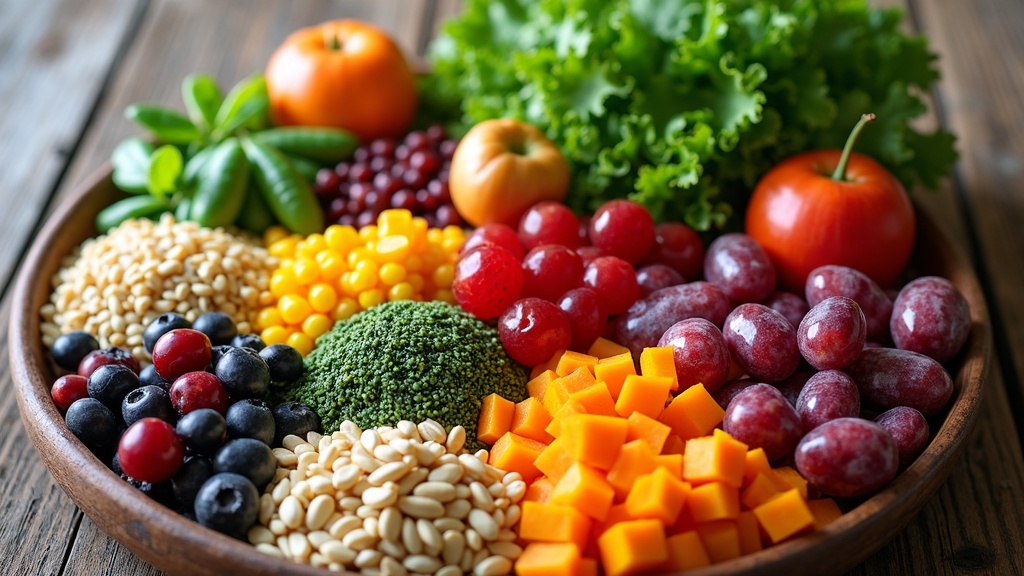Exploring ways to lower your cancer risk often leads you to some pretty interesting paths, and plantbased foods show up a lot in those conversations.
From crisp salads to wholegrain bowls and colorful fruits, these foods pack more than just flavor; they’re loaded with nutrients that help protect your health.
After a lot of reading and chatting with nutrition experts, I’ve picked up a fair bit about how plantbased foods can help in the fight against cancer.
Here’s a breakdown of how plantbased foods play a role in cancer prevention, plus ideas and tips to help you stack your plate with more of the good stuff.

Why PlantBased Foods are Helpful for Cancer Prevention
Plantbased foods cover veggies, fruits, wholegrains, beans, nuts, and seeds—pretty much anything that grows from the ground.
There’s a growing body of research suggesting that eating more of these foods is linked with a lower risk of certain types of cancer.
This isn’t just about skipping meat; it’s about filling your diet with fiber, vitamins, minerals, and plant compounds called phytochemicals, all of which can help support your body in different ways.
Eating more plants doesn’t mean you need to go fully vegan or vegetarian, but getting a bigger portion of them on your plate is associated with a healthier weight, better immune function, and less inflammation.
All of these things are important because carrying extra weight and chronic inflammation are considered risk factors for different cancers, including breast, colon, and pancreatic cancers.
Plus, a plantbased diet generally helps lower your intake of saturated fat and cholesterol, both of which can impact your health and wellbeing in various ways.
What Makes PlantBased Foods So Protective?
It’s easy to think a carrot is just a carrot, but these foods are packed with things that do some serious work behind the scenes.
- Fiber: Foods high in fiber (think beans, berries, wholegrains) can help with digestion and may bind to harmful substances, helping your body get rid of them faster. Highfiber diets are linked with a lower risk of colorectal cancer. Fiber also helps maintain steady blood sugar levels and supports a healthy gut microbiome, both of which play roles in preventing disease.
- Antioxidants: You’ll find antioxidants like vitamin C, betacarotene, and selenium in bright, colorful produce. They protect your cells from damage that could eventually lead to cancer. The antioxidant power of different fruits and vegetables also gives each one its unique benefit, making variety especially valuable.
- Phytochemicals: These are natural plant chemicals; flavonoids, carotenoids, and others; that might slow cancer cell growth or prevent DNA damage. You find them in things like tomatoes, leafy greens, onions, and berries.
- Healthy Weight: Plantbased foods are generally lower in calories and higher in water and fiber, so they help you feel full without overdoing it on calories. Keeping a healthy weight plays a big role in cancer prevention, especially for cancers related to hormones.
According to the American Institute for Cancer Research, basing at least two-thirds of your meals on plant foods is a helpful way to build a cancerprotective diet (AICR, 2024).
Building a Balanced, PlantFocused Plate
If you’re new to the idea of eating more plants, you might be unsure how to start.
I’ve found it’s not about strict rules or giving up all animal products. Instead, it’s about swapping and adding more colorful, fiberrich foods in places you might usually skip them.
Here are a few simple ways to make your meals more plantbased (without making it feel like a chore):
- Start with Veggies: Try adding a bigger serving of vegetables to your main dishes. Stir fry, roast, or grill a couple of extra types each week. Even tossing greens into pastas and sandwiches is an easy win.
- Mix Up Your Grains: Switch out white rice or pasta for brown rice, quinoa, or barley; they’re all packed with nutrients and fiber.
- Add Beans and Lentils: Throw chickpeas into salads or soups, make a lentil curry, or try refried beans with your tacos. Beans also make creamy spreads and dips that can replace cheese or mayonnaise.
- Snack on Fruits and Nuts: Instead of chips or candy, keep a bowl of fruit or a handful of nuts nearby. Dried fruit (in moderation) is another handy option for sweetness and nutrition.
- Swap Meat with Plants Sometimes: Try a meatless Monday or experiment with veggie burgers and tofu stirfries. Even just one or two meals a week makes a difference.
Making small changes and finding plantbased foods you actually enjoy is a lot more realistic than trying to flip your eating habits overnight.
You might find new favorites along the way.
Cooking with others or sharing recipes can also make the experience fun and social.
What Science Says About Plant Foods and Cancer Risk
Plenty of large studies back up the benefits of eating more plants.
Diets rich in fruits and vegetables are linked to lower risks of cancers such as colon, breast, and stomach cancers.
The American Cancer Society says aiming for at least 2.5 to 3 cups of veggies and 1.5 to 2 cups of fruit per day is a smart move.
It’s not a magic cure, but most experts agree it moves you in the right direction.
Some of the biggest benefits come from variety.
Cruciferous vegetables (like broccoli and cabbage) contain sulforaphane, a compound linked with stalling the growth of cancer cells in lab tests.
Tomatoes, which are loaded with lycopene, have been studied for their possible impact on prostate cancer risk.
Eating an array of vegetables, legumes, grains, and fruits provides different types of phytochemicals and antioxidants that work in harmony.
The most effective plate is colorful and balanced, so different nutrients can do their thing.
PlantBased Diet Pitfalls to Watch For
Going heavier on plants is usually safe for most people, but there are a few things to keep in mind so you don’t miss out on nutrients or fall for common myths.
- Don’t Neglect Protein: Beans, lentils, tofu, tempeh, and wholegrains all offer protein. You probably won’t get too little if you eat a variety, but check in with a dietitian if you’re concerned.
- Get Enough Vitamin B12: While a fully plantbased diet saves on saturated fat, it’s missing vitamin B12, which is found in animal products. If you avoid all animal foods, consider a supplement after chatting with your doctor.
- Watch for Processed Foods: Just because a food is plantbased doesn’t mean it’s always a healthy choice. Keep an eye out for highly processed fake meats, snacks, and sweets; they can be just as high in sodium and fat as their animalbased cousins.
- Go Easy on the Oil: Plant oils add flavor and some health benefits, but too much can add up in calories. Try roasting or steaming instead of deepfrying or pouring on heavy dressings.
In addition, focus on gradually increasing your fiber if your digestive system isn’t used to highfiber meals.
Give your body a chance to adapt, and always prioritize food options that make you feel your best.
Common Plant Foods and What They Offer
- Broccoli, Kale, Cauliflower: Good sources of sulforaphane, which researchers are studying for its possible cancerprotective effects.
- Berries: Filled with vitamin C, fiber, and antioxidants called anthocyanins.
- Tomatoes: Packed with lycopene, a pigment that’s being looked at for helping defend against prostate and breast cancers.
- Beans and Lentils: Offer plenty of fiber and protein plus folate and iron for healthy cell function.
- Wholegrains: Oats, brown rice, barley, farro and more, giving you fiber, manganese, magnesium, and B vitamins.
- Seeds and Nuts: Such as flaxseeds, chia, walnuts, and almonds supply healthy fat, fiber, and in some cases plantbased omega3s.
Eating a variety of these every week keeps meals interesting while pulling in a broad mix of protective nutrients.
Rotate your produce and grains to enjoy a wider variety of vitamins and minerals from season to season.
Frequently Asked Questions
Question: Do I have to give up meat entirely to get cancer prevention benefits?
Answer:
Not really. Even just shifting your meals so most of your food comes from plants, and enjoying meat or fish in smaller amounts, can be helpful. You don’t have to go totally plantbased to see benefits.
Question: Can plantbased diets help cure cancer?
Answer:
There’s no solid evidence that food alone can cure cancer, but plantbased diets are linked with a lower risk and can support your overall health if you’re going through treatment. Always talk to your medical team about nutrition if you have a cancer diagnosis.
Question: What if I have food allergies or digestive issues?
Answer:
A plantbased approach is flexible. If raw veggies don’t agree with you, cooked ones are still beneficial. If you’re allergic to certain foods (like nuts or soy), you can focus on other plant sources. A registered dietitian can offer personalized advice if you have specific needs.
Smart Tips for Adding More PlantBased Foods
Making the switch to more plantbased foods gets a lot easier when you have a few tricks up your sleeve.
Here are a few quick ways I make it work in my own kitchen:
- Batch cook big pots of beans or lentil soups and freeze small portions for later.
- Chop and prep veggies in advance, so it’s simple to throw together a salad or stirfry on weeknights.
- Try out new herbs and spices; plantbased meals get way more exciting with fresh basil, cumin, or a bit of smoked paprika.
- Keep cut fruit on hand for quick snacks or to top off your cereal.
- Blend spinach or other greens into smoothies for extra nutrition without changing the flavor much.
- Explore international cuisines like Mediterranean or Asian recipes that naturally feature plenty of plantbased dishes. You might stumble upon new favorites along the way.
Keeping things simple, colorful, and tasty goes a long way in making plantbased meals something to actually look forward to.
Don’t be afraid to swap ingredients based on what you have at home or what’s in season; flexibility helps keep things stressfree.
Switching to a plantbased diet for cancer prevention is more about adding good things than taking away favorites.
By building your meals around fruits, veggies, wholegrains, legumes, and nuts, you’re setting up a foundation for better health and taking a smart step toward lowering cancer risk.
Even small changes can lead to benefits over time, making it worth trying out as part of your daily routine.
Wrapping up, remember that enjoying what you eat makes it more likely you’ll stick with healthy choices long term.
